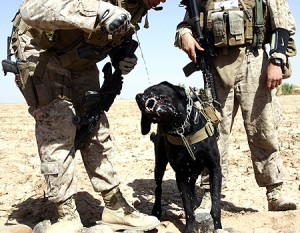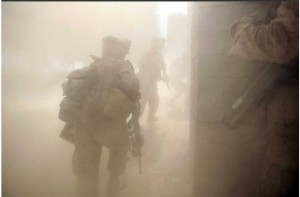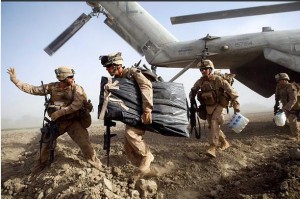More On Animals, Cops, Logistics And Survival
BY Herschel SmithAs a followup to my article Note To Cops And Survivalists: The World Is Full Of Animals, Embrace It!, Mountain Guerrilla posted a piece on animals and logistics (via WRSA), although he didn’t link back to my article.
Mosby spends some time rehearsing an Army field manual on animals and logistics, with some good suggestions for the proper use of horses. Then he poses this.
Do you know how to ride a horse? I don’t mean sit on a horse in the lesson arena either. Have you ever ridden a horse across country, through the brush? Across steep terrain. Like I said, I’m not an expert, but I’ve done both of these enough to know…and witness…untrained people fall off horses all the fucking time in rough terrain, seldom with healthy results. Have you ever actually sat on a horse ALL day long? I helped some neighbors pack a camp into the Bob Marshall Wilderness area a couple of years ago. I’d always wanted to get into the backcountry of the “Bob,” and it seemed like a much easier alternative to walking in. What would have been a two-day round trip for them turned into a four-day trip because, after sitting on a horse for 16 hours straight on the ride in? I literally, could not walk the next two days, let alone get back on the horse to ride out. It was not pretty, at all…and I’m in pretty good condition.
Check. All of the above. I have fallen off, been thrown off, bitten, run over, kicked, and just about anything that can happen on or around a horse. I have ridden horses all day long, and I do mean all … day … long, and gotten on to do it again the next day. And the next day. And the next day. I have fed them, herded them, doctored them, and assisted them to mate. If you’ve never witnessed horses mating first hand (and I’m not talking about watching the Discovery Channel), it can be a violent affair. I’ve ridden with saddles and then also (in my much younger years) bareback over mountain tops along narrow trails while running the herd). The hardest ride was bareback and (on a dare) without a bridle, only the halter.
From the age of fourteen and beyond into my early twenties, I worked weekends and summers at a Christian camp above Marietta, South Carolina named Awanita Valley (and Awanita Ranch in Traveler’s Rest). We trained and trail rode horses, fed them and cared for them, hiked the trails and cleared them of snakes and yellow jacket nests (have you ever been on a horse when it came up on a yellow jacket nest?).
When we weren’t doing that, we were cutting wood, hauling supplies, digging ditches, and baling hay. My boys did the same thing, and Daniel later (before the Marine Corps) worked for Joey Macrae in Anderson, South Carolina, an extraordinary professional horseman, breaking and training horses. I have ridden in the rain, blazing sun, and snow. I have seen my son Joshua and his horse buried up to his thighs in snow, and watched him ride the horse up from sinking in the drift and stay on him while keeping the horse and him safe.
Why is all (or any) of this important? Because as I tried to convey in my earlier post, it is critical to have an understanding and mastery over animals, especially if what we think will happen in America really happens. And Mountain Guerrilla is right about logistics too. But I’m not so sure that the Army was the first to field this idea. See my article on Marines and Mules. The Small Wars Journal had discussion on the importance of animals to logistics long ago.
The problem is that the Marine Corps has forgotten the lessons, and I’m afraid that the Army will never really take them to heart. The modern U.S. military is techno-weighted down, with gadgetry, doohickeys, and reliance on constant logistics. The so-called big dog is a symptom of this sickness, as is the huge budget for DARPA every year. Truthfully, I think this is all related to the effete pressure for gender neutrality in the military.
But don’t you forget these lessons. Plan ahead. Learn how to make fire, how to purify water, how to fight, how to make your way around terrain, and how to navigate with maps and a compass (rather than using GPS like the liar Marine Corps officer candidates who were found out during officer’s school).
And learn animals. Your life will be better for it. This goes for cops too. Lina Inverse makes an interesting point.
It just occurred to me that this puppycide policy is extremely unwise, because the desensitization works both ways. Every time a thug in uniform needlessly kills a family’s dog, that family in turn is that much more ready to return the favor someday….
It’s what Mike Vanderboegh calls losing the mandate of heaven. At one time in our history, constables were respected and admired. Children wanted to talk to them, show them respect, and even be like them. Nowadays, with enough rifles pointed at women and children while screaming obscenities, with enough dead animals, with enough abuse and danger from cops, it may not be long before the people turn on cops.
If you’re a cop, you don’t want that to happen. Believe me. You don’t want that to happen. You want to maintain the “mandate of heaven.” If you lose it, you’ve lost everything.
Make sure to drop by Mountain Guerrilla and read his informed article.









